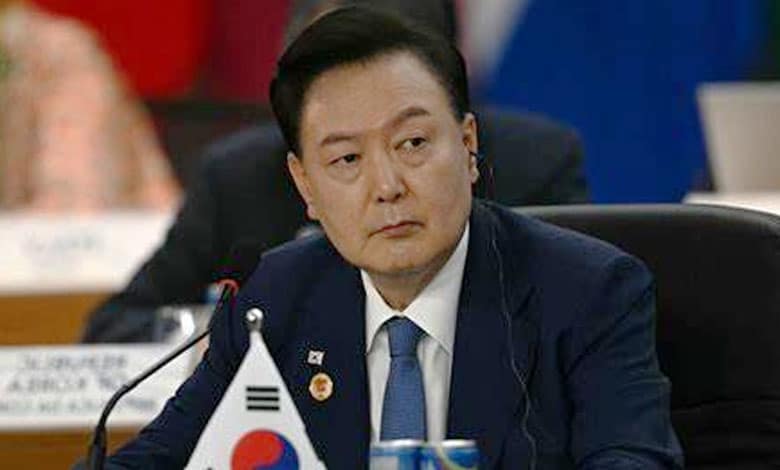South Korean President Yoon Suk-yeol drew shock and outrage on Tuesday night when he declared martial law for the first time in nearly 50 years. In a surprise late-night TV address, he cited “anti-state forces” and the threat from North Korea as his rationale.
However, it soon became evident that the declaration was driven more by his political troubles than external threats. The announcement prompted thousands to gather outside parliament in protest, and opposition lawmakers convened to initiate an emergency vote to repeal the martial law order.
Yoon appeared before the press a few hours later to accept the parliament’s decision to lift his martial law declaration. Observers have noted that Yoon’s behavior has increasingly resembled that of a leader under siege.
In his address, Yoon outlined the political opposition’s efforts to undermine his government, stating he declared martial law to “crush anti-state forces that have been wreaking havoc.” His decree effectively placed the military in command, with helmeted troops and police deployed at the National Assembly as helicopters landed on the roof during the chaos.
At approximately 11:00 p.m. local time, the military issued an order banning protests and political activities, while placing media under government control. However, South Korean politicians immediately condemned Yoon’s declaration as illegal and unconstitutional. Even the leader of Yoon’s own conservative People’s Power Party called his actions “the wrong move.”
Lee Jae-myung, head of the largest opposition party, urged his colleagues to convene at the National Assembly to oppose the declaration, calling on citizens to join them in protest. “Tanks, armored vehicles, and armed soldiers will rule the country… My fellow citizens, please come to the National Assembly,” he implored.
Thousands answered his call, gathering outside the heavily guarded parliament chanting, “No martial law!” and “End the dictatorship.” Local media captured scuffles between protesters and police at the gates, but tensions did not escalate into widespread violence, allowing lawmakers to navigate barricades and reach the voting chamber.
By 1:00 a.m. Wednesday, South Korea’s parliament, with 190 of its 300 members present, voted down the martial law measure, declaring Yoon’s order invalid.
Significance of Martial Law
Martial law is a temporary military rule imposed during a state of emergency when civil authorities cannot function. The last time it was declared in South Korea was in 1979, following the assassination of military dictator Park Chung-hee during a coup. Since the establishment of parliamentary democracy in 1987, martial law has never been invoked until this week.
In his national address, Yoon claimed he was acting to save South Korea from “anti-state forces,” while portraying the political opposition as sympathizers of North Korea, without providing evidence.
Martial law grants additional powers to the military and often suspends citizens’ civil rights and legal protections. Despite orders to restrict political activities and media operations, people defied these directives, and major news outlets continued to report freely.
Growing Political Pressure on Yoon
Elected as a hardline conservative in May 2022, Yoon’s term has been marked by stagnation since his party suffered a significant defeat in April’s general election. Following that loss, his administration struggled to advance its legislative agenda and began vetoing bills proposed by the opposition.
Yoon’s approval ratings have dropped to around 17%, hindered by various corruption scandals, including one involving the First Lady, who faced scrutiny for accepting a luxury handbag. Last month, Yoon publicly apologized and announced the creation of an office overseeing the First Lady’s duties, but he rejected calls for a broader investigation into the matter.
As political tensions escalated, the opposition proposed cuts to a major government budget bill that could not be vetoed and initiated moves to impeach cabinet members for their failure to investigate corruption claims involving the First Lady.
What Comes Next?
Yoon’s abrupt declaration left many in South Korea confused for several hours regarding the implications of martial law. However, the swift response from opposition lawmakers enabled a rapid gathering at parliament, allowing them to vote down the measure effectively.
Despite the military’s presence and police enforcement, a military takeover did not occur. Under South Korean law, martial law must be lifted if a majority in parliament votes against it, and the law also prevents military authorities from arresting lawmakers.
The path forward for Yoon remains uncertain, with some protests outside parliament calling for his arrest. His controversial action has sent shockwaves through a nation that prides itself on its thriving democracy. Observers view this as one of the most significant challenges to the democratic ideals in decades.
Experts believe that the situation could have lasting ramifications for South Korea’s reputation as a stable democracy. “Yoon’s declaration of martial law appears to be both a legal overreach and a political miscalculation, needlessly jeopardizing South Korea’s economy and security,” noted Leif-Eric Easley, a political analyst at Ewha University in Seoul. “He sounded desperate, making a rash move in response to rising scandals and challenges to his authority, which are likely to intensify now.”
As outlined by the speaker of parliament on Wednesday, “We will protect democracy together with the people.” This sentiment underlines a commitment among lawmakers and citizens alike to safeguard their democratic values in the face of perceived government overreach.
The fallout from Yoon’s decision may encourage greater civic engagement and mobilization among South Koreans concerned about their rights and freedoms. Enhanced political activism could arise from this crisis, forcing the government to re-evaluate its approach and respond to the will of the people, emphasizing the importance of accountability and the rule of law.
The events of this week, while alarming, may ultimately act as a catalyst for deeper discussions about democracy in South Korea, reinforcing the resolve of its citizens to ensure that their voices are heard and that their democratic norms are upheld. As the nation processes this unprecedented situation, all eyes will be on how the government and its citizens navigate the aftermath of this tumultuous moment in South Korean history.
Credit: BBC News




